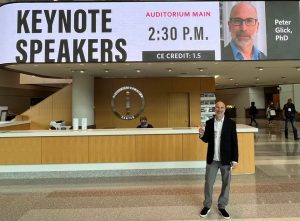 Dr. Glick delivers clear, accessible, and compelling keynote speeches for corporate, professional, and academic audiences. Recent keynotes include speaking at the American Psychological Association’s 2022 convention and to corporate sponsors at Stanford University’s VMWare Women’s Leadership Innovation Lab).
Dr. Glick delivers clear, accessible, and compelling keynote speeches for corporate, professional, and academic audiences. Recent keynotes include speaking at the American Psychological Association’s 2022 convention and to corporate sponsors at Stanford University’s VMWare Women’s Leadership Innovation Lab).
Dr. Glick has also delivered executive education in corporate (e.g., Bayer Healthcare) and academic (e.g., Harvard University) settings. Along with Robert Livingston (Harvard), he helped to develop anti-bias training for Airbnb.
Diversity and inclusion efforts often backfire, making matters worse instead of better because audience members feel scolded rather than engaged. I approach corporate education presuming good intentions, showing where and how bias unintentionally and subtly creeps into decision-making. Rather than blaming individuals, engaging demonstrations and quizzes show how to identify biased organizational procedures and how to alter them to combat bias.
I am able to make cutting edge research on discrimination and diversity accessible to all audiences and to consult on how to overcome organizational barriers to women’s leaderships.
Sample Speaking Topics
Fixing Organizational Biases that Undermine Women’s Leadership
Although people like women better than men, they accord women less respect, seeing them as more fragile and in need of protection. Unfortunately, “protecting” women leads to giving less honest or critical feedback, less challenging assignments, and dependency-oriented (rather than autonomy- oriented) mentoring. In short, well-intended norms about “how to treat women” inhibit women’s advancement. Further, benevolently sexist treatment undermines women, causing intrusive self-doubts that diminish performance. Organizations can combat these tendencies through awareness, tracking resource allocation, and wise mentoring practices that help everyone (men included) while promoting inclusion, motivation, and trust among underrepresented groups such as women and minorities.
Repairing the Toxic Organization: How Masculinity Contest Cultures Harm Organizations and How Leaders Can Change Them
What creates so many organizational scandals ranging from risky investments to ethical misconduct and sexual harassment? In masculinity contest cultures, proving “mine’s bigger than yours” takes precedence over organizational goals, leading to misconduct (toxic leadership, sexual harassment, bullying) and an alienated workforce with high turnover, burnout, and less organizational dedication. Although masculinity contests especially disadvantage women and minorities, they harm majority men as well. This talk reveals the four signs that your organization has a toxic, masculinity contest culture and how to fix it. Organizations need to go beyond standard diversity and harassment interventions, which typically fail or backfire because they do not address the underlying cause. Leaders must leverage core business goals and values (e.g., innovation) that require behaviors incompatible with masculinity contest norms.
He’s a “Brilliant Jerk,” She’s Something Else that Starts with B: How Warmth and Competence Trade-offs Undermine Women and Minorities
We perceive others on two fundamental dimensions: warmth and competence. Groups are often stereotyped as high on one dimension but low on the other – as warm but incompetent (e.g., women, older people) or competent but cold (e.g., Asian-Americans). Double standards about warmth and competence advantage majority men. Men, but not women, who misbehave may be seen as “brilliant jerks,” excusing bad (cold) behavior as the natural cost of keeping a competent, “top performer.” Women and disadvantaged minority members are not given the same latitude, creating a double bind. When women live up to warmth expectations, their perceived competence suffers (e.g., “Beth is so nice… but not leadership material”). But when they prove their competence, they are penalized for being cold. Minority groups stereotyped as competent but cold (e.g., Asians) face penalties as well (e.g., “Jin is competent, but lacks the social skills to lead”). Organizations can inhibit these discriminatory processes through greater awareness, vigilance, and by debiasing evaluation and promotion practices.